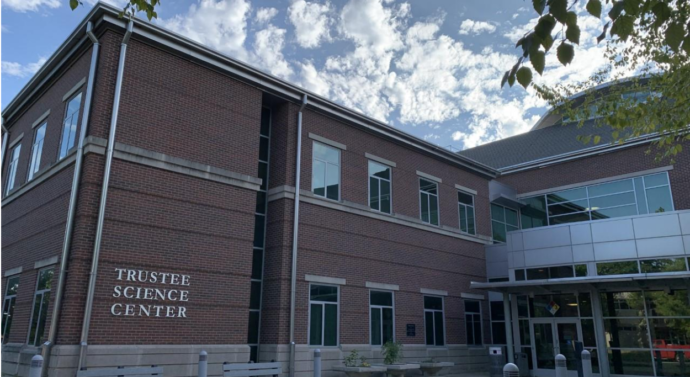
Online, seated or somewhere in between: Trying to find a happy medium for classes in the School of Natural and Mathematical Sciences
Campus News, Front Page September 18, 2020, Comments Off 62The School of Natural and Mathematical Sciences, largely hosted in the Trustee Science Center, faced unique challenges in the fall. Majors in this college, ranging from chemistry to physics to behavioral neuroscience, demand a certain level of hands-on work that cannot be supplemented without access to the right supplies and setting. While other schools on campus had some classes offered through an entirely online format, this was not an option in the TSC.
Of course, any decision would be met with backlash. What is best for many is still not always best for all. Kaitriana Powell-Smith, a junior biochemistry major, elaborated on her thoughts as an immunocomprised student.
Powell noted that Zooming into a class is only an option if one is actively sick or quarantined. The university purchased an estimated 80 cameras for classrooms as part of their COVID response to broadcast lessons for students in that scenario.
From her own experience and talking with other students, Powell said that “there’s not been any sort of leniency” in virtually attending a class if not actively ill. Powell spoke with the university over the summer to clarify her anxieties about her own health and what options were available.
“I expressed concerns for my health and that these courses weren’t offered online, and basically what was said was that I could either take them through Drury GO – which would set me behind in my major – or I could take a semester off,” she said.
“I understand that there’s a lot of factors that go into it, but it has to be taken into account the health of the students,” Powell said.
The Mirror previously spoke with Drury administration and the Student Health and Public Safety Committee and the fall planning process. The story is available here:
While these choices are hard, Powell felt more could have been done before pushing seated courses.
“It’s better to lose money than to lose students,” she said.
Powell is also involved with theatre, another intensive in-person department.
“Because campus opened, I have to be on campus,” she explained.
Charlotte’s Web, which ran from Sept. 16-19, felt the effects of the pandemic in its cast.
“Wilbur, one of our lead actors, got tested for COVID. He doesn’t think he has it, but we don’t have his results back. So we’re doing [opening night] with an understudy,” Powell said.
A central dilemma for the TSC and science majors is the amount of interaction required for classes. Between labs and discussions, there isn’t a lot of room for Zoom.
“So many of my classes are discussion-based, and there’s not a lot of lecture, there’s a lot of working through problems together. If I’m over Zoom, I can’t do that. But I think there should have been some option for students who weren’t comfortable with coming back to campus,” Powell expanded.
“I don’t think it’s the professors’ faults at all. I think it’s the nature of being a biochem major,” Powell explained.
The outcomes of an online spring
After the announcement from Drury, Dr. Wesley Rowley had a week and a half to transform his five courses into an online format.
An associate professor of biology, Rowley is in his 32nd year at Drury.
“In order to teach anatomy, you have to have good hands-on or visual presentations so they understand them,” Rowley said, elaborating on the trials of online science classes.
With a total of 65 students, he made it his mission to answer any question. Dr. Rowley reached out to students individually over the phone to ensure they were progressing in the class during the spring.
“I made myself available from 8 a.m. to midnight, seven days a week,” Rowley said.
“I’m not a computer whiz like some of my colleagues are,” Rowley said. Despite initial difficulties, he adapted and has Zoomed multiple lectures to his students this semester.
Moving forward
All professors in the TSC were told over the summer to be prepared for anything. Dr. Rowley has his classes prepped for an all-seated semester or the migration to hybrid or online. After a stressful switch over spring break, he feels much more prepared.
Rowley continues to work with students who feel unwell and can’t make it to class.
“I don’t record the lectures, but I do Zoom them,” he stated, sharing that 10 lectures were broadcast to quarantined or sick students.
“It’s my job to do my best to make sure students have a positive experience,” he continued.
“We have to be smart, we have to be safe, we have to be responsible and we have to look out for everybody,” Rowley concluded.
The Mirror reached out to Dr. Pietrich for comment, but received no answer.
Written by Maclen Johnson